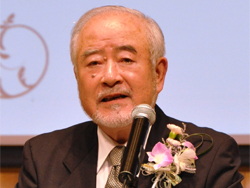Selecting the Award Recipients of the 2nd SAKAI Peace Contribution Award
Mr. Yoshio Kawashima; Member of the Screening Committee

I would like to thank the great number of attendees at the 2nd SAKAI Peace Contribution Award Ceremony for their time and consideration today.
As a representative of the committee, I am more than grateful to give my citation report here.
In June 2009, we sent out nomination request forms to both domestic and overseas intellectuals and academic institutions with a total of 500 referees. We subsequently conducted the screening of 21 nominees, including both individuals and groups.
As a result, the committee selected Mr. Motoi Tauchi as the Grand Prize recipient, Ms. Agalyn Nagase and LALA Association for Afghan Orphan Support as the Encouragement Prize recipients.
Mr. Tauchi, the Grand Prize recipient was born in Mokpo, the Republic of Korea, as a son of Mr. Yun Chi Ho and a Japanese mother, Ms. Chizuko Tauchi, who raised 3,000 orphans over 30 years at the Mokpo Kyoseien Foster Home and was later known as ‘The Mother of Korean Orphans.’ His father went missing one day amidst the chaos of the Korean War, so after his mother passed away, he took on the position as the head of the foster home in 1968.
He moved to Japan in 1982 where he realized the sadness of Korean elderly residents in Japan dying without friends or family around. Wanting to create a place where elderly Korean people could relax in a homely environment, Mr. Tauchi founded the ‘Kokoro-no Kazoku’ (Family of Hearts, a social welfare corporation) in 1988. He subsequently established ‘Kokyo-no Ie’ (House of the Old Home, a senior people’s home) in Sakai City in 1989.
Not only did he establish a day care center for the elders in Ikuno Ward, Osaka City, in 1994 and ‘Kokyo-no Ie’ facilities in Kobe in 2001 and in Kyoto in 2008, he also contributed to Japan-South Korea international exchange and understanding along with the development of his welfare activities for the Korean elderly residents in Japan.
With the rising number of foreign residents in Japan and the development of globalization within societies, it is an important challenge for those engaged in the multicultural communities to consider how elderly foreign individuals can actively live out their lives. Facing this challenge, Mr. Tauchi’s personal viewpoint as a civilian, gained support and sympathy from his society, which in turn contributed to his efforts.
His work has not only been significantly recognized as a successful model case of the universal community that pursues the dignity of individuals but also been highly valued because his outstanding exchange activities have formed considerate societies that appreciate cultural diversity and true freedom.
Next, for the Encouragement Prizes, we have awarded two nominees.
One is Ms. Agalyn Nagase. She was born in Mindanao, Republic of the Philippines, and now lives in Saitama Prefecture, serving as General Manager of KAFIN, a Filipino mutual aid organization in Kawaguchi City.
Since the post-war period, there has been a confrontation between the government and the Moro people, the native Islamic tribe who built their own culture and society in Mindanao, the southern Philippines. This conflict escalated in 1970, resulting in a large number of victims and refugees.
A mutual ceasefire was implemented in 2003 and peace talks started that have continued intermittently; however the area still remains in an unstable condition.
In addition, there are currently some 200,000 Filipino nationals living in Japan and many of them are experiencing social and cultural difficulties.
Since Ms. Nagase established an Islamic youth organization in 1984, she extended her activities to support female and child victims from the Mindanao crisis in securing their lives and self-determination by launching the Moro Women’s Center in 1990 and the Pasasambao Integrated Health Service in 2000.
After her marriage to a Japanese national in 1995, she moved to Japan in the following year, and in 1998 established KAFIN with its head office in Warabi City. This association provides a wide range of assistance, from consultancy on single-motherhood and domestic violence issues to Japanese language classes for Filipino mothers and introduction of Filipino culture to the local schools and communities. Now, it has six branch offices in Tokyo, Yokohama, Nagoya, Osaka, Gunma and Nagano.
Despite the fact that Ms. Nagase was a victim of the Mindanao war herself, she has not only provided self-reliance support to a large number of victims in her homeland, but also seized every opportunity for local peace building by promoting mutual understanding. Her work has received a high evaluation from the screening committee because its core values focus on the security and enhancement of freedom, autonomy, and the independence of people and their communities.
Moreover, Ms. Nagase has been supporting Filipino nationals living in Japan who face many problems. By reinforcing local communication activities and the understanding of cultural diversity, she has contributed to the creation of a universal community that values and preserves the basic rights, dignity, and opportunities of individuals.
We have another Encouragement Prize recipient, LALA Association for Afghan Orphan Support. This is an NGO based in Ikoma City, Nara Prefecture.
After 20 years of civil war, the Islamic Republic of Afghanistan is currently making an attempt to reform the nation; however, there is still political unrest and its people continue to lead unstable lives.
Afghan women do not have sufficient social or economic freedom and neither do children who have lost their fathers to disease or war. They are often considered as orphaned minors. Many of them are trapped in poverty and, therefore, forced to live apart from their families, for example in a foster home, or to work in severe conditions to support their families.
LALA Association was established in 2003 to support orphans suffering from these tragic conditions, and in 2005 a new orphanage was built in Herat, western Afghanistan, and later the facility was donated to the state government.
These days, the association is working to improve the living conditions of foster homes in Herat, supplying household goods and also hiring local teachers to provide children’s education in English language and PC skills.
In 2008, the organization set up a handcraft-workshop providing local women with jobs and a place where they can produce traditional Kilim rugs and embroideries to help them obtain financial independence, and ultimately to enable them to lead stable lives.
Building on the empathy and support of locals and working reactively to the local conditions, LALA Association has achieved a great deal. Its work to improve the living conditions of Afghan orphans and to provide children with educational opportunities have been a great leap-forward for Afghan people’s more stable lives. The association is highly valued for its in-depth activities towards the creation of a universal community that values and preserves the basic rights, dignity and opportunities of individuals.
Finally, I would like to extend my deep respect and congratulations to the award recipients and also would like all the attendees here today to understand the objectives of this award. It focuses on recognizing those who commit a great deal of effort to resolve challenges we are facing across the globe, and on conveying the values of peace and human rights both domestically and internationally. Through this award, we will realize our obligation to tackle these issues, working together to build world peace.
